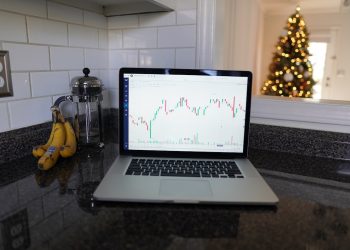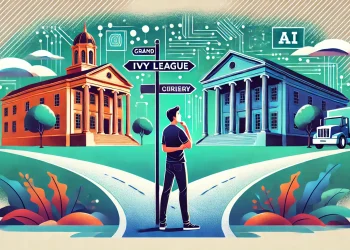No products in the cart.
Embracing AI: How Global Exchanges are Driving Innovation
Global exchanges are embracing AI technologies, transforming trading landscapes and careers. Explore the innovations shaping our future.
New York, USA — As the sun rises over Wall Street, a silent revolution is taking shape. Artificial Intelligence (AI) is not just a buzzword; it’s the lifeblood of a new era in trading. Exchanges worldwide are harnessing the power of AI to streamline processes, reduce risks, and ultimately reshape the job market.
In a world where algorithms can analyze vast amounts of data in seconds, the speed of decision-making has reached dizzying heights. For traders, this means adapting to a landscape where intuition is often replaced by data-driven predictions. Just ask the team at the New York Stock Exchange (NYSE), where AI-driven platforms are now analyzing market trends faster than humanly possible. This shift promises to redefine the very nature of trading.

The integration of AI in trading is not merely a technological upgrade; it’s a paradigm shift. Gone are the days when traders relied solely on gut feelings or traditional analytical methods. Now, sophisticated algorithms can forecast market movements based on historical data and real-time analytics. According to a recent study by the Financial Times, nearly 70% of trading decisions in major exchanges are now influenced by AI technologies[1].
Yet, this transformation brings with it a double-edged sword. While AI enhances efficiency, it also raises pressing questions about job security. Are we witnessing the dawn of a new age where human traders are rendered obsolete? Or is this merely an evolution of the role, where traders become more like interpreters of AI data rather than the decision-makers? The latter seems to be the prevailing view among industry experts.
The challenge lies in adapting our skills to work alongside these technologies.” This sentiment resonates across the industry.
In an interview with Sarah Johnson, a senior analyst at a leading trading firm, she remarked, “AI is not here to replace us; it’s here to augment our capabilities. The challenge lies in adapting our skills to work alongside these technologies.” This sentiment resonates across the industry. As AI takes on routine tasks, traders are being urged to develop skills that complement AI capabilities—critical thinking, complex problem-solving, and emotional intelligence.
In Europe, the London Stock Exchange (LSE) is pioneering AI integration with a focus on regulatory compliance and risk management. The LSE has implemented AI systems that can predict potential regulatory breaches before they occur. This proactive approach not only protects the integrity of the market but also ensures that human oversight remains a cornerstone of trading. The LSE’s innovations serve as a model for other exchanges grappling with the implications of AI.
However, the challenge of AI integration is not solely technical; it’s also cultural. Many organizations are struggling with the cultural shift required to fully embrace AI. Training programs are emerging that focus on upskilling employees, emphasizing the importance of collaboration between humans and machines. Companies like Goldman Sachs are investing heavily in workforce development initiatives aimed at fostering a culture of continuous learning.
As AI continues to evolve, so too will the nature of work in trading and finance. The World Economic Forum predicts that by 2025, 85 million jobs may be displaced due to the rise of AI and automation, but 97 million new roles could emerge that are more aligned with the new division of labor[2]. This is an opportunity for the younger workforce, particularly those in the 16-35 age bracket, to position themselves advantageously.
The gig economy is also feeling the impact of AI innovations. Freelancers and gig workers who are adept at leveraging AI tools have a competitive edge. Platforms like Upwork are witnessing a surge in demand for AI specialists, data analysts, and tech-savvy professionals. The ability to navigate and utilize AI tools can set candidates apart in an increasingly crowded job market.
As we peer into the future, the question is not whether AI will impact trading; it’s how we will adapt to these changes. Educational institutions are already responding by integrating AI and data analytics into their curricula, preparing students for the jobs of tomorrow. Universities are collaborating with industry leaders to ensure that graduates are not just knowledgeable but also equipped with the skills to thrive in an AI-driven world.
Companies like Goldman Sachs are investing heavily in workforce development initiatives aimed at fostering a culture of continuous learning.
In the grand scheme of things, AI is not just a tool for traders; it’s a catalyst for a broader evolution in the workplace. The financial sector’s embrace of AI is a microcosm of a global trend where technology and human expertise must coexist. As we forge ahead, the challenge will be to create a workforce that is not only technologically savvy but also adaptable. The future belongs to those who can marry human intuition with machine efficiency, creating a symphony of innovation that resonates across industries.
As we navigate this transformative landscape, one thing is clear: the future of work is not a choice between man and machine; it’s a partnership. Embracing this partnership will require courage, creativity, and a commitment to lifelong learning. For the ambitious minds within the 16-35 age group, this is a call to action. The future is bright for those willing to embrace change, learn new skills, and adapt to the rhythm of the AI revolution.











